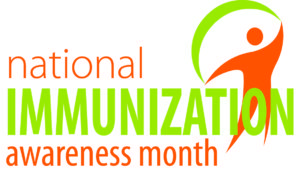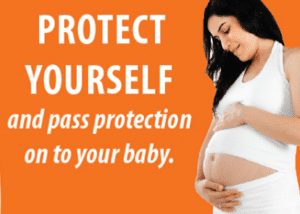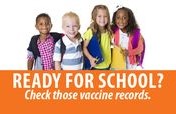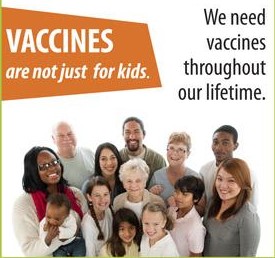 August is National Immunization Awareness Month (NIAM). Immunizations represent one of the greatest public health accomplishments of the 20th century. The purpose of NIAM is to celebrate the benefits of vaccination and highlight the importance of vaccination for people of all ages.
August is National Immunization Awareness Month (NIAM). Immunizations represent one of the greatest public health accomplishments of the 20th century. The purpose of NIAM is to celebrate the benefits of vaccination and highlight the importance of vaccination for people of all ages.
Vaccines begin in the womb and continue through adulthood.
Pregnant Women:
Vaccines are an important component of a healthy pregnancy. Women should be up to date on their vaccines before becoming pregnant, and should receive vaccines against both the flu and whooping cough (pertussis) during pregnancy. These vaccines not only protect the mother by preventing illnesses and complications, but also pass on protection to her baby before birth.

Women who are planning to become pregnant may need to receive some vaccines before the start of pregnancy. These vaccines, such as the measles mumps rubella (MMR) vaccine, may need to be administered at least 4 weeks before a woman becomes pregnant. Some vaccine-preventable diseases, such as rubella, can lead to significant pregnancy complications, including birth defects.
Pregnancy is a good time for expectant mothers to start learning about the safe, proven disease protection that vaccines will provide to their babies once they are born. To learn more on what vaccines are needed before, during and after pregnancy click here
Babies, Young Children & School Age Children:
When children are not vaccinated, they are at increased risk for disease and can spread disease to others in their play groups, child care centers, classrooms and communities – including babies who are too young to be fully vaccinated and people with weakened immune systems due to cancer and other health conditions.


Babies receive vaccinations that help protect them from 14 diseases by age 2. It is very important that babies receive all doses of each vaccine, as well as receive each vaccination on time. After age 2, children are still recommended to receive a yearly flu vaccine. Children will also be due for additional doses of some vaccines between 4 and 6 years of age. For an easy to read schedule of vaccines for babies and young children click here
Preteens & Teens:
Preteens and teens need four vaccines to protect against serious diseases:
Along with helping protect preteens and teens from certain diseases like the flu, being vaccinated also helps stop the spread of these diseases to others in their family, classroom, and community.
Adults:
All adults should get vaccines to protect their health. Even healthy adults can become seriously ill, and can pass 

Vaccination is important because it not only protects the person receiving the vaccine, but also helps prevent the spread of disease, especially to those that are most vulnerable to serious complications such as infants and young children, elderly, and those with chronic conditions and weakened immune systems.
For more on adult vaccinations click here

